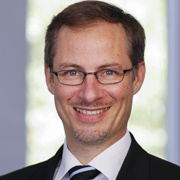Mitarbeiter*innen

Prof. Dr. Chris Eberl
Co-Koordinator Forschungsbereich C
Principal Investigator Forschungsbereiche B und C
Ordentlicher Professor für Mikro- und Werkstoffmechanik
Technische Fakultät | Institut für Mikrosystemtechnik
Albert-Ludwigs-Universität Freiburg
Stellvertretender Institutsleiter, Fraunhofer-Institut für Werkstoffmechanik IWM, Freiburg
Tel.: +49 761 5142 495
E-Mail: chris.eberl@iwm.fraunhofer.de
Areas 0f Expertise
Materialzuverlässigkeit | Materialermüdung | Mechanismen physikalischer Degradation | Programmierbare Materialien | Experimentelle Mechanik | Digitale Materialdarstellung
Projekte in livMatS
- Logic gated soft autonomous machine walker with soft switches and sensors for environmental interaction
- MetaGen4Morphing– Implementation of a programmable meta materials toolbox for complex shape morphing in adaptive and long living materials systems by simulation, experiments and machine learning
- Generation of Materials with Adaptive Mechanical Properties – Stimulus-Induced Lignification and Softening
- Resilient hierarchical microfluidic networks for fuel transport and information processing
- The mistletoe-host interface as model for long-term integrity by damage prevention and repair
- AI²nterface – Advanced interfaces for modular livMats through AI assisted design and experimental realization of programmable materials interfaces
- Soft autonomous machine systems driven by hydrogen peroxide based gas pressure generation with logic gated fuel/gas distribution system (H2O2LogicGatesSaM)
- Gallisense - Giving materials the passive ability to sense
- Solstore II - Development of photosupercapacitors and photobatteries with high power and energy densities and long-term stability
- Self-sealing by orchestrating chemical and mechanical mechanisms and processes as basis for self-healing in livMatS
- Eingebettete (mikro)-fluidische Netzwerke in weichen Materialsystemen: Ein Weg zu adaptiven Prozessen, Selbstregulierung und Selbstreparatur
- Logic Self-Reporting Mechano-Adaptive Metamaterials
- Abscission and self-repair in biological and artificial materials systems
- Training and self-healing by interface snapping mechanisms
- Development of a TAPAS (Tiered Approach for Prospective Assessment of Benefits and Challenges) and first applications
Doktorand*innen (Erstbetreuer)
Abgeschlossene Promotion (Erstbetreuer)
Postdoktorand*innen (Erstbetreuer)
Postdoktorand*innen-Projekt (Erstbetreuer)
Publikationen in livMatS
- Bio-Inspired Pressure-Dependent Programmable Mechanical Metamaterial with Self-Sealing Ability*
Ghavidelnia, N., Slesarenko, V., Speck, O., Eberl, C. (2024). Bio-Inspired Pressure-Dependent Programmable Mechanical Metamaterial with Self-Sealing Ability. Advanced Materials, 2313125. doi: 10.1002/adma.202313125 - Swelling and deswelling driven multimaterials silicone hopper with superior specific power and energy*
Hu, S., Li, C., Wang, H., Mylo, M., Becker, J., Cao, B., Müller, C., Eberl, C. & Yin, K.(2024). Swelling and deswelling driven multimaterials silicone hopper with superior specific power and energy. Materials & Design, 241, 112960. https://doi.org/10.1016/j.matdes.2024.112960. - Manufacturing size effect on the structural and mechanical properties of additively manufactured Ti-6Al-4V microbeams*
Yin, K., Cao, B., Todt, J., Gutmann, F., Tunçay, H. F., Roth, A., Fischer, F., Grübel, N., Pfaff, A., Ganzenmüller, G., Keckes, J., Hiermaier, S. & Eberl, C. (2023). Manufacturing size effect on the structural and mechanical properties of additively manufactured Ti-6Al-4V microbeams. Journal of Materials Science & Technology, 149, 18-30. doi: 10.1016/j.jmst.2022.12.006 - Flow charts as a method to transfer self-sealing from plant models into programmable materials and related challenges*
Cao, B., Ghavidelnia, N., Speck, O., & Eberl, C. (2023). Flow charts as a method to transfer self-sealing from plant models into programmable materials and related challenges. Programmable Materials, 1, e12. doi: 10.1017/pma.2023.11 - Curly beam with programmable bistability*
Ghavidelnia, N., Yin, K., Cao, B., & Eberl, C. (2023). Curly beam with programmable bistability. Materials & Design, 230, 111988. doi: 10.1016/j.matdes.2023.111988. - Controlling malleability of metamaterials through programmable memory*
Wenz, F., Schönfeld, D., Fischer, S. C., Pretsch, T., & Eberl, C. (2023). Controlling malleability of metamaterials through programmable memory. Advanced Engineering Materials, 25(3), 2201022. doi: 10.1002/adem.202201022 - Development of a Scalable Fabrication Concept for Sustainable, Programmable Shape‐Morphing Metamaterials*
Schwarz, A., Lichti, T., Wenz, F., Scheuring, B. M., Hübner, C., Eberl, C., & Elsner, P. (2022). Development of a Scalable Fabrication Concept for Sustainable, Programmable Shape‐Morphing Metamaterials. Advanced Engineering Materials, 24(11), 2200386. doi: 10.1002/adem.202200386F - Optimal design of shape changing mechanical metamaterials at finite strains*
Lichti, T., Leichner, A., Andrä, H., Müller, R., Wenz, F., Eberl, C., Schwarz, A. & Hübner, C. (2022). Optimal design of shape changing mechanical metamaterials at finite strains. International Journal of Solids and Structures, 252, 111769. doi: 10.1016/j.ijsolstr.2022.111769 - Designing shape morphing behavior through local programming of mechanical metamaterials*
Wenz, F., Schmidt, I., Leichner, A., Lichti, T., Baumann, S., Andrae, H., & Eberl, C. (2021). Designing shape morphing behavior through local programming of mechanical metamaterials. Advanced Materials, 33(37), 2008617. doi: 10.1002/adma.202008617 - Adaptive Wettability of a Programmable Metasurface*
Specht, M., Berwind, M., & Eberl, C. (2020). Adaptive Wettability of a Programmable Metasurface. Advanced Engineering Materials, 2001037. doi: 10.1002/adem.202001037
* Funded by the Deutsche Forschungsgemeinschaft (DFG, German Research Foundation) under Germany's Excellence Strategy – EXC-2193/1 – 390951807